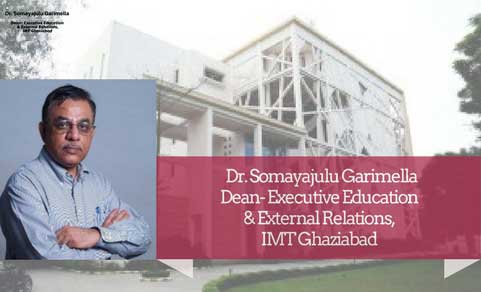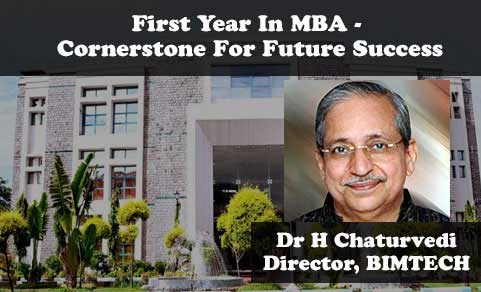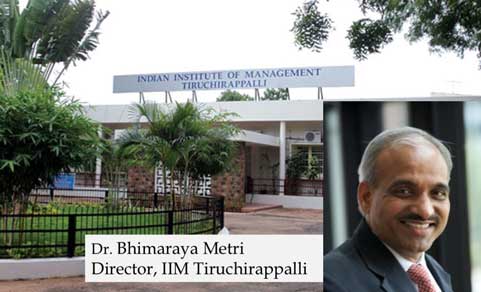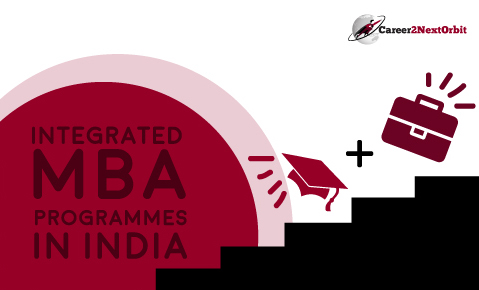
This interview is aimed at helping the candidates understand the actual picture, the benefits and the opportunities that lie around Executive MBA. For this discussion, Executive MBA means 1 year (or 15-month) fully residential program.
Career2NextOrbit: How do you like to define the executive MBA, the various options and the various programs being offered in India?
Dr. Somayajulu: Executive MBA is meant for people who have already worked in the industry and would like to upgrade their skills and knowledge to move up in their career. People with 4-5 years experience and who would like to accelerate their career for which their current competencies and qualifications may not be adequate would benefit from Executive MBA. Many part-time management programs offered by various B-Schools catered to this segment, but in the last 1 ½ decades full-time Executive MBA has gained popularity with leading B-Schools such as ISB, IIMs and other leading business schools including IMT. Modular Executive Programmes provide one more option for experienced executives planning to acquire management qualification.
Career2NextOrbit: What are the positives & negatives of 3 years part-time program v/s 1-year full-time program?
Dr. Somayajulu: The 3-year part-time program is a good option for executives to acquire management degree while working. The part-time program is as rigorous and covers all the courses that 2-year full-time programs offer but the perceptions about the quality of the program of both the industry and the aspirants do not reflect this fact. These perceptions are justified to some extent since working executives are not able to devote enough time for their studies due to their professional and personal commitments which obviously impacts the quality of their qualification. On the other hand, the full-time Executive Program enjoys a good reputation for quality and has better acceptance among corporate recruiters since they are able to focus on their courses without any distraction.
Career2NextOrbit: Can we also say, sir, that it is a case of a high-risk high-return, as people who wish to play very safe by continuing job and studies may not get as good result as compared to executives who are committed for 1 year?
Dr. Somayajulu: I would not say it’s a high-risk high-return or low-risk low- return. For example, Chicago’s Booth School has a very successful part-time program and has produced equally if not more competent graduates than reputed full-time programs. It all depends on the rigor and quality that is maintained by the students and the school. As far as the full-time executive program is concerned, the quality and rigor can be maintained since the students are free to focus on their program without the pressures associated with a job. Of course, there are opportunity costs associated with a full-time program such as loss of salary and in some cases seniority in the organization. However, our experience shows that these disadvantages are only temporary and students who have taken the risk of joining the program have moved back to the industry with a significant increase in their salary and certainly with a better job profile. However, aspirants to the full-time program should be aware that this program is meant to be a career accelerator and not a platform to switch domains or careers.
Career2NextOrbit: That was very well covered sir! In fact, one of the concerns that we have seen from both the sides is that many students coming to this program are those who wish to switch to another industry and if in case things do not go as per their plan, they feel disappointed.
Dr. Somayajulu: That’s true. And that is where I think we should take care to set right expectations of aspirants at the admission stage. Aspirants should be clearly told that this program is a career accelerator and not a platform to switch careers. If they are very clear about this aspect, then they will visualize the benefits of this program.
Career2NextOrbit: With a significant majority of IT background students in Executive Education; don't you think it’s the responsibility of the B-Schools to promote diversity in the batch for cross learning and future avenues?
Dr. Somayajulu: I think you are right. While there is a natural tendency and, perhaps for right reasons, for IT professionals to explore executive education, somewhere along the way this program has not been projected to people from other sectors that will benefit from this program as well. It is relevant at this point to mention that organizations should also take the initiative of sponsoring their executives on sabbatical to this program since it offers the twin benefits of retaining high potential employees and building a good leadership pipeline.
Career2NextOrbit: What are 4-5 things which you would like to advise to people who are looking forward to doing Executive education. What are the things they should check about the course and college?
Dr. Somayajulu: Since a person is taking some risks by joining a full-time program, it is very important to take the right decision and here a bit of research will be very helpful.
1. School: The pedigree, reputation, ranking, years of the standing and the positions that the alumni of the school hold are a few aspects that need to be definitely considered.
2. Curriculum: Contemporary and relevant curriculum is an important consideration. Otherwise, you will end acquiring knowledge and skills which will not propel your career the way you wanted. For instance, at IMT Ghaziabad, we have completely revamped the curriculum last year to reflect the needs of the industry. Some highlights of the current program architecture include six distinct phases and an 8-week Global Accelerator lab at one of the reputed European Partners of IMT Ghaziabad. In addition, it not only focuses on knowledge but also on skills and attitudes that industry demands. The program is also delivered by some of the best faculty in the country using a range of innovative pedagogical techniques.
Career2NextOrbit: How has been the industry response in terms of both, the collaboration to deliver as well as the acceptance of the passing out graduates?
Dr. Somayajulu: IMT Executive programs have always enjoyed an excellent reputation among industry professionals. With the recent revamping of the curriculum, industry interface has increased significantly. It is very heartening to know that senior industry professionals have evinced keen interest in associating with the program and sharing their experiences. We certainly appreciate their contribution in raising the quality of our program significantly.
Career2NextOrbit: If we talk about the 5-year scenario between 2012 to 2017, how do you think the industry acceptance of this program has changed?
Dr. Somayajulu: I don’t have the statistics to prove this point. However, by and large, the perception of the industry towards one year program has certainly changed due to leading B-Schools that made a mark in this particular format which includes ISB, IIMs, and others.
Career2NextOrbit: Why do you think that other B-Schools barring a few like ISB, Great Lakes, and SP Jain, have not been able to register their presence in the minds of executive MBA aspirants? In the coming times, do you see any coming together of both the ends?
Dr. Somayajulu: Some of the schools you mentioned had the first mover advantage in this format. Moreover, many leading business schools focused and still do on their two-year flagship programs. This scenario is changing and we at IMT Ghaziabad have started giving due importance to this format in particular and executive education in general.
Career2NextOrbit: If we go back to 2005-07, the era saw mushrooming of B-Schools in India; right now, we are seeing mushrooming of institutions offering 1 yr MBA programs. A lot of these institutes are not even approved or accredited by certification
bodies. What would your message be to aspirants with respect to approvals and accreditation?
Dr. Somayajulu: One should certainly look for AICTE approval as it assures that the program maintains minimum standards. However, they should look beyond AICTE approved programs and certainly consider those that are accredited by international agencies such as AACSB, AMBA, and Equis.
Career2NextOrbit: In recent times, specialized MBA courses like 1yr program in Business Analytics, Financial Risk, Forensic Audit etc have come up. And then there are institutes offering a more comprehensive 1 yr program. What is your advice to aspirants when they decide to go for either of the two?
Dr. Somayajulu: There are pros and cons of both general and specialized programs. It is more of a personal choice. If one wants to keep more options and explore more opportunities, then a general management program makes more sense. If one is determined to get into specific domain such as data analytics or banking or finance then one should choose a specialized course. Both are suitable in that sense. However, it makes sense to choose general MBA and then to do specialized certification courses in specific domains without foreclosing other possible career options.
Career2NextOrbit: Please share some USPs of IMT executive MBA program.
Dr. Somayajulu: The program has six distinct phases, namely, foundation, functional, international exchange (Global Acceleration Lab at a leading European business school), customization, integration and dissertation phases that take them through the foundation to very advanced courses in a well thought out sequence. We have put our most experienced faculty in this program to provide a unmatchable learning experience. The students attend an 8-week Global Acceleration Lab at a leading European partner school where they attend advanced courses on supply chain management, digital marketing, cross-cultural management, etc. The program follows the KSA framework where the emphasis is not only on providing knowledge but also equipping the students with necessary skills and shaping their attitudes to enhance their chances of success in their career. Students are trained in design thinking, negotiation skills, creativity, execution, communication skills, etc, to make them industry ready. They are also sensitized to issues such as sustainability and social responsibility during the program. In essence, we believe in creating well-rounded individuals who can take on their roles in the industry with supreme confidence and perform at every level when they get back to their careers.
About Dr. Somayajulu: Current: Dean Executive Education & External Relations, IMT-Ghaziabad
Previous: Director & Dean of Faculty of Management Studies, Institute of Management, Nirma University









